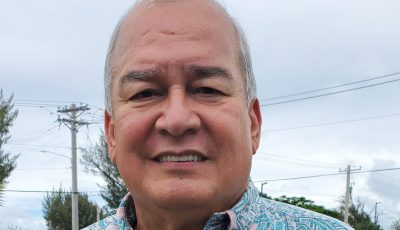Kilili: $2.9B eyed for NMI in Democrats next relief act
The Marianas would receive over $2.9 billion to deal with the health and economic crisis caused by the coronavirus in the relief act Democrats in the U.S. House of Representatives released yesterday and plan to pass on Friday. Delegate Gregorio Kilili C. Sablan (Ind-MP) said that much of what he asked for—direct aid to schools and the Commonwealth government, continued relief for individuals and households, and CIP funding—has been included in the bill.
The Health and Economic Recovery Omnibus Emergency Solutions, or HEROES, Act also includes tighter timelines for getting money to those in need. “It is great to see that $42 million in recovery rebates is finally being paid out in the Marianas,” Sablan said. “But almost two months after passage of our last big relief measure, the CARES Act, those unemployed in the Marianas still cannot apply for help, much less get the $940 weekly benefit that Congress provided. That is why I asked for more statutory deadlines that federal and local governments have to meet for distributing money from the HEROES Act.”
Like House members everywhere, Sablan has been conferencing on hours-long Democratic caucus meetings and small-group issue forums during drafting of the bill. He said he was grateful to Speaker Nancy Pelosi and Appropriations chair Nita Lowey, key architects of the HEROES Act, for never forgetting the Marianas and other non-state areas and for the generosity of their action.
“$2.9 billion is triple the Marianas’ gross domestic product in the best year,” Sablan said. “It is as much as the Commonwealth has received from the federal government since our beginning.
“This is a lot of money. But we face a very, very long road to recovery,” he warned. “The Commonwealth will have to use this money in the wisest way possible; or we will not recover.”
He also cautioned that the Democratic proposal itself faces a long road to enactment. “Republicans in the House and the Senate have already said the HEROES Act is ‘dead on arrival.’ And the Trump administration has paused its talks with Congress on any further relief. The President is hoping we will all reopen our economies over the coming weeks and the coronavirus just disappears.”
Lost revenue
A key goal for Sablan in this round of legislation was to replace lost revenue to the Commonwealth government as a result of the abrupt end of tourism in January as the coronavirus struck China, Korea, and other tourist markets. The drop in revenues forced cuts to retirees, teachers, and essential services.
The HEROES Act sets aside $20 billion for the governments of American Samoa, Guam, the Marianas, Puerto Rico, and the U.S. Virgin Islands. Within 30 days of enactment the Marianas would receive $2.14 billion.
Sablan also asked for more funding for schools, along with his bipartisan Pacific Delegate colleagues, in their joint request to leadership on April 14. The CARES Act provided $27,940,945 for Marianas education, money that Education Assistant Secretary Frank Brogan promised Sablan would be wire-transferred this week.
Now, the HEROES Act proposes an estimated $81 million for Marianas schools from an education stabilization fund. “The CARES Act money should replace what the Commonwealth budgeted for education this year, but has failed to pay,” Sablan said. “The education stabilization funds alone could cover all of the next school year for PSS, NMC, and NMTI. And there is additional money in the HEROES Act just for colleges, which Northern Marianas College will also qualify for.
“Education has always been my No. 1 priority, making sure teachers get paid and students can continue learning, even in the middle of a global pandemic, I still believe is the best way to ensure that we have a bright future.”
The HEROES Act also includes monies for county-level governments, like the Saipan, Tinian, Rota, and Northern Islands municipalities. “One problem with putting so much money in the hands of governors,” Sablan said, “it does not always trickle down to where it is needed. So we are making sure that local governments, which provide many public services, get relief, too, just as we do for schools.”
Assistance
Individuals and families are not left out of the Democrats relief act. Pandemic unemployment assistance of about $340 weekly in the Marianas for those who lost work because of the coronavirus would continue through the end of January 2021, along with the additional $600 weekly being paid nationwide. Altogether CARES Act and HEROES Act unemployment benefits could put $350 million into the Marianas economy.
The HEROES Act also includes a second round of recovery rebates of $1,200 for individuals and $2,400 for joint tax-filers that began in the CARES Act and is now being paid out in the Marianas. Up to three dependent children would qualify for $1,200 each, an increase from the $500 benefit in the CARES Act. And, retroactively, all dependents, including full-time students below age 24, become eligible for the CARES Act credit, as do those who use an individual taxpayer identification number and not a social security number. Both changes Sablan advocated for.
“As I wrote in my formal request to leadership, in the long-term, direct cash aid to individuals encourages taxable consumption and taxable employment. For that reason, putting money directly in peoples’ pockets is more economically efficient than giving money to state and territorial governments, even if we have to give to governments just to get through the immediate crisis,” he said.
Sablan is one of over one hundred members of the House and Senate who asked leadership to include a guaranteed income provision in the HEROES Act with recurring monthly direct payments to low-income households. “That simple program could replace unemployment, and food stamps, and the other patchwork of aid,” Sablan said. “It would be much easier for the government to administer and much easier for those we want to help to get their money.” At least for now, that proposal is not in the HEROES Act.
The Earned Income Tax Credit, one of Sablan’s longstanding goals for lower income households, did make it into the bill, however. Taxpayers can use the credit to offset what they owe; or if they owe less than the amount of the credit, they get a cash refund. The federal government will cover the cost of the EITC in the Marianas. Sablan first started working on this legislative action in 2015 with his bill, H.R. 4309.
The HEROES Act also makes the child tax credit fully refundable for 2020 and increases the amount to $3,000 per child up to age 17, or $3,600 for a child under age 6. The Act provides about $30 million to help cash-strapped Marianas families with the costs of water and other utilities and for homeowner expenses, such as mortgage payments and insurance. And $1.82 million is set aside specifically for the Marianas Nutrition Assistance Program.
A third key ask
Sablan and the Pacific area delegates also requested funding for critical infrastructure, in particular linking water and sewage infrastructure to public health. Leadership listened. The HEROES Act contains $945 million for capital improvement projects in the insular areas. The Environmental Protection Agency estimates that $1.05 billion is necessary over the next 20 years to bring water infrastructure in the Marianas, American Samoa, Guam, and the U.S. Virgin Islands up to par.
“This is the scale of funding we wanted,” Sablan said. “First-world water infrastructure is absolutely necessary to keep everyone healthy and to rebuild our tourism economy.
“Some funding will also need to go to the hospital and other facilities that provide direct care,” he added.
The HEROES Act also sets aside $55 million for technical assistance to the insular areas, as did the CARES Act. The Commonwealth has already been allocated its $4 million from the earlier legislation. And the HEROES Act allows for the use of disaster funds as a local match for FEMA grants.
Improvements to Medicaid
Sablan and Pacific delegates’ goal of repealing the cap on federal Medicaid expenditures in the islands was only partially addressed. The HEROES Act does remove the cap, but for expenditures that result from the increased federal/local matching rate, which would now be 97/3 beginning July 1. Currently the federal/local matching rate for the Marianas is 89/11.
“This is definitely a step in the right direction,” Sablan said. “And it gives us a basis to negotiate with the Senate for a full repeal.”
Sablan’s legislation repealing the cap on Medicaid, H.R. 6495, now has 21 co-sponsors, including a number of committee and subcommittee chairs. Medicaid is the federal health insurance program for low-income persons. Over 15,000 people in the Marianas get their healthcare through Medicaid.
Relief for veterans
Another underserved group, often at special risk from the coronavirus and highlighted by Sablan in a personal letter to Pelosi on May 5, is the veterans community in the Marianas.
The HEROES Act responds to veterans’ needs in a number of ways. Veterans without a disability, but determined to have a financial hardship, would now qualify for enrollment in the Veterans Administration’s health care system, and be exempt from payment of hospital and medical care copays.
The deadline for veterans to file claims and appeals for VA benefits, including disability compensation, is extended for the duration of the coronavirus public health emergency and for 90 days after the emergency has ended.
And the Act prohibits the Veterans secretary from taking enforcement actions to collect payments for benefit debts, establishing new benefit debts, sending notices regarding benefit debts to individuals or consumer reporting agencies, allowing interest to accrue on benefit debts, or applying administrative fees on benefit debts. (PR)



























